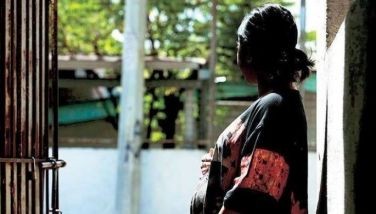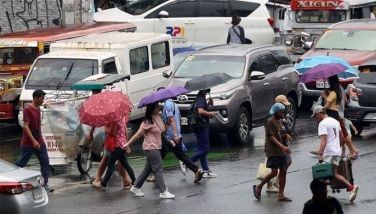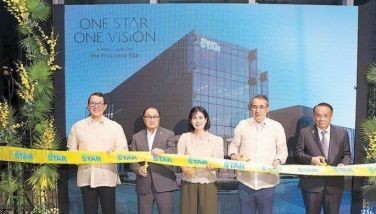‘Spare my amnesty plan from politics’

December 20, 2003 | 12:00am
President Arroyo appealed yesterday to critics of her proposed general amnesty for all rebels and political foes of her administration to give it a chance to come into fruition before shooting it down.
Mrs. Arroyo reiterated that her proposed general amnesty is in line with her desire to achieve "genuine reconciliation" to unite a deeply divided Filipino people.
The Department of Justice (DOJ), meanwhile, expressed support for the President’s proposal, saying it would not necessarily compromise the country’s laws and legal processes.
Outgoing Justice Secretary Simeon Datumanong said the amnesty was in accord with Mrs. Arroyo’s policy of national reconciliation and part of her prerogatives as Chief Executive.
In her speech at the 68th founding anniversary of the Armed Forces of the Philippines at Camp Aguinaldo in Quezon City yesterday, the President insisted anew that the proposed general amnesty has nothing to do with politics to promote her bid for a full six-year term in the May 2004 elections.
"I would like to spare this (amnesty) from politics because this is a sincere and earnest effort to transform our divisions into unity and thereby see a clear path to a brighter future," she said.
"The country has had enough of political bickering and partisan strife," she said. "Bitter memories of the past are hampering our goal to move forward. We cannot have change before genuine reconciliation with justice."
Under the Palace draft copy of the amnesty grant — tentatively called the "National Healing and Reconciliation Act of 2003" — Mrs. Arroyo earlier said this will extend a general amnesty to various rebel groups as well individuals and other groups which had had "political clashes" with her administration.
The bill seeks to create the five-member National Healing and Reconciliation Commission (NHRC) which would be empowered, among other things, to implement the grant of amnesty to those involved in past political conflicts.
The President, however, clarified that she would leave it up to Congress to determine whether the general amnesty grant will be extended to the Marcoses and their cronies, the supporters of deposed President Joseph Estrada who rioted on May 1, 2001, and the military rebels who launched the failed coup last July 27.
Presidential Spokesman Ignacio Bunye told reporters yesterday the Palace would submit the proposed amnesty grant in the form of an "executive proclamation" for concurrence by both chambers of Congress.
"That’s the mode being considered," Bunye disclosed. "As of now, there is no final document yet. This is still a work in progress. We have to complete the work first."
Since the proposed amnesty grant is still being drafted, Bunye said legislators could make their suggestions and criticisms on how to refine it.
"Of course, President Arroyo is willing to listen to all views in order to find a legal basis for this," Bunye said. "At this time, what we have are general principles. But it’s really a sincere gesture of the President in order to heal the wounds of society."
For his part, Datumanong explained that though sensitive, the amnesty program would be good for the nation as it would encourage people to be one with the government in achieving its goals.
On the other hand, Justice Undersecretary Jose Calida said an amnesty does not cover criminal offenses like plunder, of which Estrada was charged before the Sandiganbayan.
"Plunder is not a political act per se. Only cases that involve furtherance of a political ideology should be included," Calida said.
He noted amnesty "is an act of grace by the State" and forward-looking as some of the cases it might cover have not even gone to court for trial.
"The act of applying for amnesty is in itself an admission but it is a different level of admission, unlike in the court where the accused is made to plead guilty or not guilty," Calida said.
Calida said it should be up to the commission to be formed by the President what crimes to include in the amnesty program.
One of the controversial issues involving the amnesty is that of Donato Continente and Juanito Itaas, the convicted killers of US Col. James Rowe.
"We should handle this particular case properly. That is a sensitive issue," Calida said.
The United States government has been firmly asking that Continente and Itaas be excluded from the list of political detainees whom the Arroyo government would pardon.
The US Embassy said the Philippine government should respect the court ruling on the case.
But some sectors deem America’s communications with the Philippine government as an "interference" in the country’s "legislative and executive decision-making."
Continente and Itaas were initially sentenced to life imprisonment for the murder of Rowe and the near-killing of his driver in an ambush in Quezon City by the Alex Boncayao Brigade in 1989.
Since the term of former President Fidel Ramos, Continente has been nominated for pardon as the high court downgraded his role in the Rowe murder from principal to accomplice.
Continente’s jail term was subsequently reduced to a minimum 12 years and six months to a maximum of 17 years.
Itaas, meanwhile, was still held primarily responsible for the killing of Rowe and the wounding of the driver. — With Aurea Calica
Mrs. Arroyo reiterated that her proposed general amnesty is in line with her desire to achieve "genuine reconciliation" to unite a deeply divided Filipino people.
The Department of Justice (DOJ), meanwhile, expressed support for the President’s proposal, saying it would not necessarily compromise the country’s laws and legal processes.
Outgoing Justice Secretary Simeon Datumanong said the amnesty was in accord with Mrs. Arroyo’s policy of national reconciliation and part of her prerogatives as Chief Executive.
In her speech at the 68th founding anniversary of the Armed Forces of the Philippines at Camp Aguinaldo in Quezon City yesterday, the President insisted anew that the proposed general amnesty has nothing to do with politics to promote her bid for a full six-year term in the May 2004 elections.
"I would like to spare this (amnesty) from politics because this is a sincere and earnest effort to transform our divisions into unity and thereby see a clear path to a brighter future," she said.
"The country has had enough of political bickering and partisan strife," she said. "Bitter memories of the past are hampering our goal to move forward. We cannot have change before genuine reconciliation with justice."
Under the Palace draft copy of the amnesty grant — tentatively called the "National Healing and Reconciliation Act of 2003" — Mrs. Arroyo earlier said this will extend a general amnesty to various rebel groups as well individuals and other groups which had had "political clashes" with her administration.
The bill seeks to create the five-member National Healing and Reconciliation Commission (NHRC) which would be empowered, among other things, to implement the grant of amnesty to those involved in past political conflicts.
The President, however, clarified that she would leave it up to Congress to determine whether the general amnesty grant will be extended to the Marcoses and their cronies, the supporters of deposed President Joseph Estrada who rioted on May 1, 2001, and the military rebels who launched the failed coup last July 27.
Presidential Spokesman Ignacio Bunye told reporters yesterday the Palace would submit the proposed amnesty grant in the form of an "executive proclamation" for concurrence by both chambers of Congress.
"That’s the mode being considered," Bunye disclosed. "As of now, there is no final document yet. This is still a work in progress. We have to complete the work first."
Since the proposed amnesty grant is still being drafted, Bunye said legislators could make their suggestions and criticisms on how to refine it.
"Of course, President Arroyo is willing to listen to all views in order to find a legal basis for this," Bunye said. "At this time, what we have are general principles. But it’s really a sincere gesture of the President in order to heal the wounds of society."
For his part, Datumanong explained that though sensitive, the amnesty program would be good for the nation as it would encourage people to be one with the government in achieving its goals.
On the other hand, Justice Undersecretary Jose Calida said an amnesty does not cover criminal offenses like plunder, of which Estrada was charged before the Sandiganbayan.
"Plunder is not a political act per se. Only cases that involve furtherance of a political ideology should be included," Calida said.
He noted amnesty "is an act of grace by the State" and forward-looking as some of the cases it might cover have not even gone to court for trial.
"The act of applying for amnesty is in itself an admission but it is a different level of admission, unlike in the court where the accused is made to plead guilty or not guilty," Calida said.
Calida said it should be up to the commission to be formed by the President what crimes to include in the amnesty program.
One of the controversial issues involving the amnesty is that of Donato Continente and Juanito Itaas, the convicted killers of US Col. James Rowe.
"We should handle this particular case properly. That is a sensitive issue," Calida said.
The United States government has been firmly asking that Continente and Itaas be excluded from the list of political detainees whom the Arroyo government would pardon.
The US Embassy said the Philippine government should respect the court ruling on the case.
But some sectors deem America’s communications with the Philippine government as an "interference" in the country’s "legislative and executive decision-making."
Continente and Itaas were initially sentenced to life imprisonment for the murder of Rowe and the near-killing of his driver in an ambush in Quezon City by the Alex Boncayao Brigade in 1989.
Since the term of former President Fidel Ramos, Continente has been nominated for pardon as the high court downgraded his role in the Rowe murder from principal to accomplice.
Continente’s jail term was subsequently reduced to a minimum 12 years and six months to a maximum of 17 years.
Itaas, meanwhile, was still held primarily responsible for the killing of Rowe and the wounding of the driver. — With Aurea Calica
BrandSpace Articles
<
>
- Latest
- Trending
Trending
Latest
Trending
Latest
Recommended































